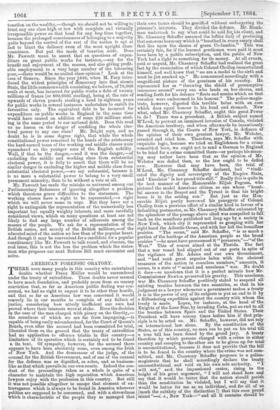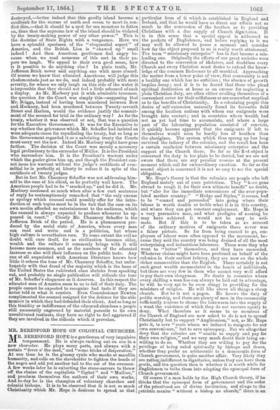AMERICAN FORENSIC ORATORY.
THERE were many people in this country who entertained doubts whether Franz Muller would be surrendered under the treaty of extradition. These doubts never seemed to have much foundation, and probably arose from an uneasy conviction that, so far as American public feeling was con- cerned, we had no right to expect it to be other than hostile, and that so far as American law was concerned it would scarcely lie in our mouths to complain of any failure of justice, considering how utterly inefficient our own had proved where their interests were at stake. Even the decision in the case of the men charged with piracy on the Gerrity,— the soundness of which we are far from impugning,—is capable of being easily misunderstood, for the Court of Queen's Bench, even after the accused had been committed for trial, liberated them on the ground that the treaty of extradition had no application to offences triable in this country—a limitation of its operation which is certainly not to be found n its text. Of sympathy, however, for the accused there appears to have been absolutely none, even among the Irish of New York. And the demeanour of the judge, of the counsel for the British Government, and of one of the counsel for the defence was as dignified, as sober, and as business- like as that which prevails in our own courts. Indeed the con- duct of the proceedings taken as a whole is quite of a character to maintain the high reputation which American lawyers enjoy with the profession in this country. But still it was not possible altogether to escape that element of ex- travagance which is always to be found in America wherever politics are supposed to be concerned, and with a shrewdness which is characteristic of the people they so managed that their own tastes should be gratified without endangering the prisoner's interests. They divided the defence. Mr. Blank- man undertook to say what could be said for., his client, and Mr. Chauncey Schaffer assumed the loftier duty of producing that sonorous harmony which is "breathed in every empty shell that lies upon the shores of green Co-lumbia." This was certainly fair, for if the learned gentlemen were paid it must have been by a public subscription, and the public of New York had a right to something for its money. At all events, paid or unpaid, Mr. Chauncey Schaffer had realized the great fact by the enunciation of which Colonel Chollop immortalized himself, and well knew that "we are a model to the airth and must be jist cracked up." He commenced accordingly with a magnificent picture of the greatness of his country. He represented her as " throwing the shield of presumptive innocence around" every one who lands on her shores, and sending forth for his defence "fleets and armies which on that occasion were embosomed in his honour." The police-magis- trate, however, digested this terrible bolus with an ease which does equal honour to his head and stomach. Now what, asked Mr. Chauncey Schaffer, ought this great Power to do ? There was a precedent. A British subject named M'Leod, to prevent an imminent invasion of Canada, violated the American territory, and when afterwards he incautiously. passed through it, the Courts of New York, in defiance of- the opinion of their own greatest lawyer, Mr. Webster, arrested and tried him. Therefore, says Mr. Schaffer with exquisite logic, because we tried an Englishman for a crime committed here, we ought not to send a German to England to be tried for a crime committed there—or perhaps his mean- ing may rather have been that as the opinion of Mr. Webster was defied then, so the law ought to be defied. now. However that may have been, the trial of M'Leod, Mr. Chauncey Schaffer declared, had "vindi- cated the dignity and sovereignty of the Empire State, and Excelsior' is her proud title still." Really this is quite in the best manner of the Honourable Elijah Pogram, who pictured the model American citizen as one whose "boast- ful answer to the Despot and the Tyrant is that his bright home is in the setting sun." But just as the Hon- ourable Elijah partly borrowed his panegyric of Colonel Chollop from a previous effort of a similar kind in favour of a defaulting postmaster, so Mr. Chauncey Schaffer exhausted by the splendour of the passage above cited was compelled to fall back on the manifesto published not long ago by a society in New York, which city it represented as grasping with her right hand the Atlantic Ocean, and with her left the boundless prairies. " The ocean," said Mr. Schaffer, " is as much a portion of the heritage of the American people as the broad' prairies "—he must have pronounced it " perearers,"—" of the West." This of course aimed at the Florida. The fact that a war vessel had slipped out of our ports in spite of the vigilance of Mr. Adams and our own Government, and "had sunk great argosies laden with the choicest treasures of the nation in countless numbers," amounts, it seems, to a state of " mixed and unsolemn " war. No doubt it does—so unsolemn that it is a perfect miracle how Mr. Commissioner Newton preserved his gravity. This unsolemn war Mr. Chauncey Schaffer positively stated to suspend all existing treaties between the two countries, so that in his judgment as a lawyer whenever a government makes a treaty it is in the power of any of its subjects to put an end to it by a filibustering expedition against the country with whom the treaty is made. Lopez, for instance, at the head of the Knights of the Lone Star, by invading Cuba, put an end to all the treaties between Spain and the United States. Their President will have uneasy times before him if that prin- ciple is to be acted on. Mr. Schaffer, however, did not rely on international law alone. By the constitution of the States, as of this country, no man can be put on his trial till a true bill has been found by the grand jury. A treaty therefore by which persons charged with a crime in either country and escaping to the other are to be given up for- trial is unconstitutional, because it does not provide that the bill is to be found in the country where the crime was not com- mitted, and Mr. Chauncey Schaffer proposes to a police- magistrate that he shall accordingly declare the treaty unconstitutional and void on his own sole authority. " I will not," said the impassioned orator, rising to the , height of his great argument, " I will not stand here and say that it would be better that the nation should perish than the constitution be violated, but I will say that it would be better for me as an individual, and for all of us (mark the subtlety of the distinction !) that this once proud island "—i. e., New York—" and all it contains should be destroyed,—better indeed that this goodly island became a sandbank for the storms of earth and ocean to meet in con- flict dire,—that it should be a spot for sea monsters to fatten on, than that the supreme law of the island should be violated by the treaty-making power of any other power." This is the doctrine of State Rights with a vengeance. Here we have a splendid specimen of the " eloquential aspect" of America, and the British Lion is " chewed up " small indeed ! And then American gentlemen feel angry be- cause when we read nonsense of this sort in their pa- pers we laugh. We appeal to their own good sense, how is it possible to do anything else ? In plain truth, Mr. Jefferson Brick never said anything one whit more absurd. Of course we know that educated Americans will judge this rhodomontade just as we do, and indeed probably with more severity, for where we only laugh on this side of the water it is impossible that they should not feel a little ashamed of such a display. As Mr. Marbury put it with admirable terseness, the question for the Court was simply this—supposing that Mr. Briggs, instead of having been murdered between Bow and. Hackney, had been murdered between Twenty-seventh Street and Harlem, would the evidence justify the commit- ment of the accused for trial in the ordinary way ? As for the treaty, whether it was observed or not, that was a question forthe Executive Government. It was for the Executive to say whether the grievances which Mr. Schaffer had insisted on were adequate cause for repudiating the treaty, but so long as the Government regarded it as a subsisting treaty the Courts must carry out the law. Indeed Mr. Marbury might have gone farther. The decision of the Court was merely a necessary legal preliminary to the surrender of Muller. It is the President who surrenders him. It is the President's warrant under which the gaoler gives him up, and though the President can- not issue his warrant without the judge's certificate of com- mittal he is perfectly at liberty to refuse it in spite of the certificate of twenty judges.
But in fact Mr. Chauncey Schaffer was not addressing him- self to the case of his client, as he perfectly well knew. The American people had to be " cracked up," and he did it. Mr. Marbury confessed as much when after a few curt sentences of reply he contemptuously remarked that " the only excuse or apology which counsel could possibly offer for the intro- duction of such topics must be in the fact that the case on its own merits afforded no entertainment to the audience, which the counsel is always expected to produce whenever he ap- peared in court." Clearly Mr. Chauncey Schaffer is the Jefferson Brick of the period. He is a phenomenon pro- duced by the social state of America, where every man can read and write and is a politician, but where high culture is nevertheless rare. To some extent the evil no doubt will cure itself, for as civilization becomes older, wealth and the culture it commonly brings with it will become more common, and as the numbers of the educated increase so also will their influence on the public taste. Any one at all acquainted with American literature knows how little it echoes the tone of Mr. Chauncey Schaffer, but unfor- tunately with that dread of the majority which is the bane of the United States the cultivated class shrinks from speaking out, and probably no single publication will ridicule the tone of Mr. Schaffer's eloquence as it deserves. In this respect the educated men of America seem to us to fail of their duty. The people cannot be expected to recognize bad taste if they are never told in what it consists. Even Commissioner Newton complimented the counsel assigned for the defence for the able manner in which they had defended their client. And so long as this timidity or indifference of the educated abindons a people still necessarily engrossed by material pursuits to its own uncultivated instincts, they have no right to feel aggrieved if they are involved in the ridicule which it provokes.































 Previous page
Previous page